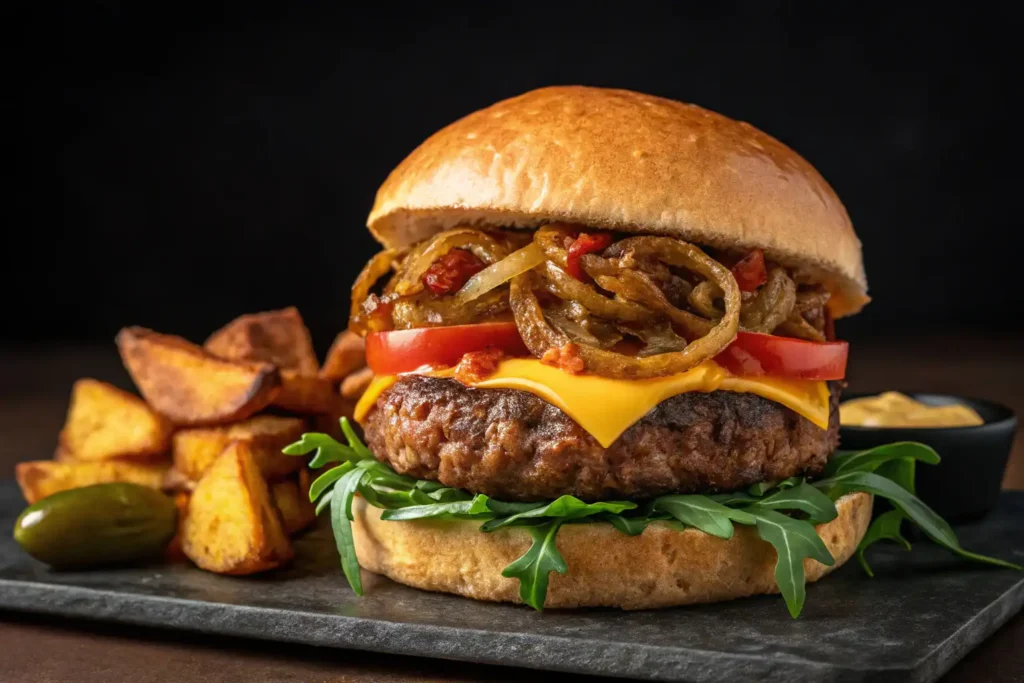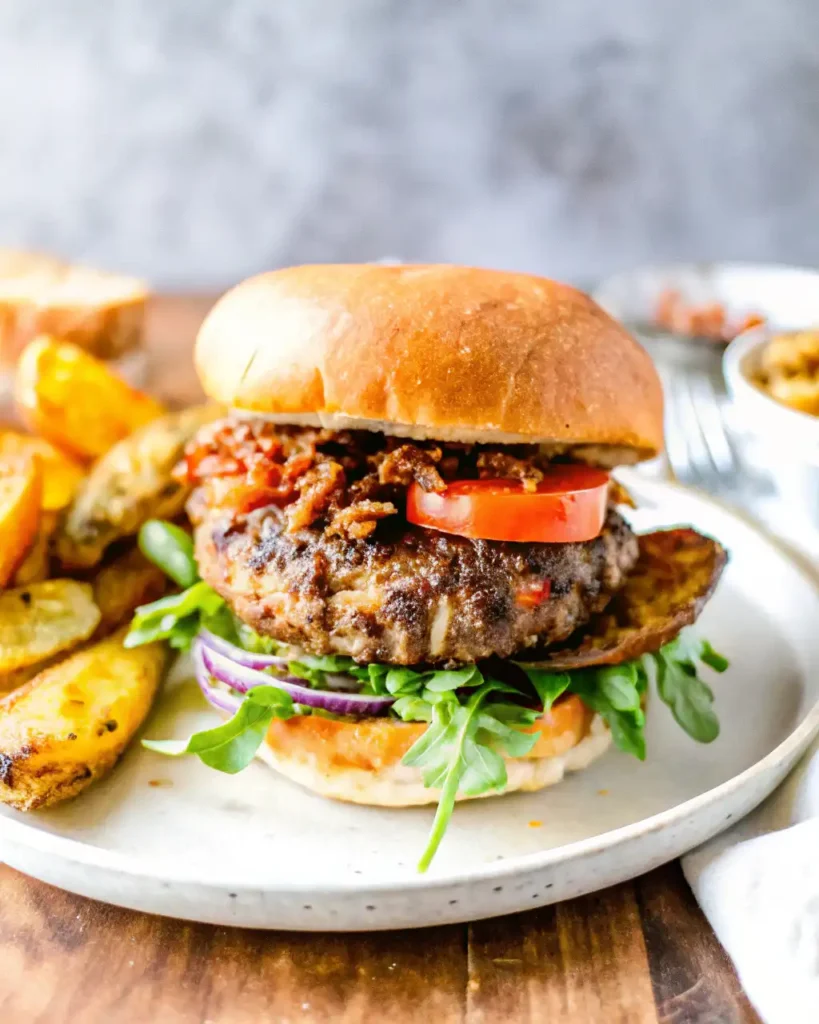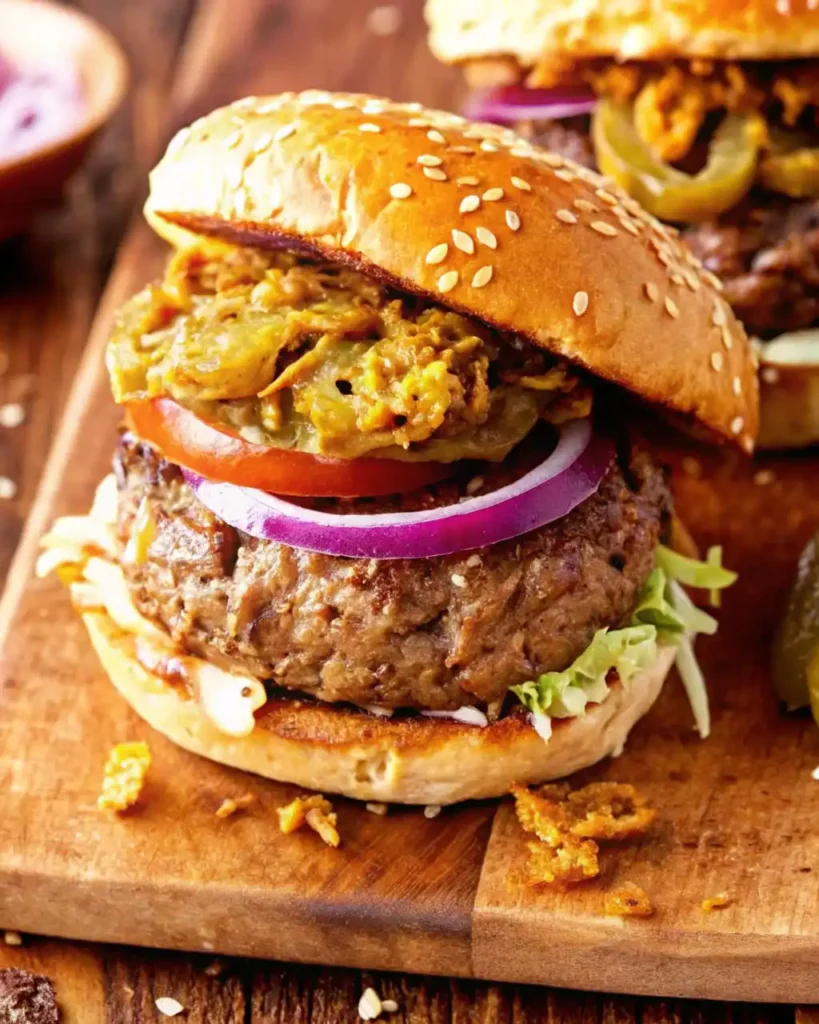Burgers are a cornerstone of American food culture. Whether you’re flipping patties in your backyard, grabbing one at a local diner, or firing up the grill at a summer BBQ, burgers have a special place in our hearts (and stomachs). But not all burgers are created equal. While beef has long been the go-to choice, more people are discovering bison meat as a leaner, tastier, and arguably better option for burgers.

So Is bison meat good for burgers? If you’ve been eyeing those packs of ground bison at the grocery store but weren’t sure how they’d measure up, this post will break it all down. From taste to nutrition to cooking tips, I’ll show you why bison might just be the burger upgrade you didn’t know you needed.
Bison vs. Beef: What’s the Difference?
Before diving into the details, let’s talk about what makes bison meat different from beef. Both are red meats and come from animals in the bovine family, but their similarities pretty much end there.
Taste
Bison meat has a bold, slightly sweet flavor that’s less fatty and less greasy than beef. It’s like beef, but with a cleaner, richer taste. Some people even say it has a hint of earthiness, thanks to the animals’ diet of grass and natural forage.
Texture
Because it’s leaner, bison meat has a firmer texture. However, when cooked properly, it’s tender and juicy—just like a great burger should be.
Nutritional Profile
Here’s where bison really shines. Compared to beef, bison is:
- Lower in fat: About 2 grams of fat per 3-ounce serving versus 13 grams in beef.
- Lower in calories: Around 143 calories per serving compared to beef’s 213.
- High in protein: You’ll get about 22 grams of protein in a 3-ounce serving.
- Packed with nutrients: Bison is rich in iron, B vitamins, zinc, and selenium.
Sustainability
Bison meat tends to be more eco-friendly than beef as they are raised on open pastures rather than feedlots, with many producers using grass-fed and hormone-free practices, making this more eco-friendly choice.
The Flavor Profile of Bison Burgers

Let’s talk about the star of the show: bison burgers. How do they stack up against your traditional beef patties?
Bison burgers bring a deep, natural flavor to the table. They’re less greasy than beef burgers, which means you can actually taste the meat without it being overpowered by fat. The sweetness in bison meat pairs beautifully with burger toppings like caramelized onions, cheddar cheese, and smoky sauces.
The lean nature of bison also means it doesn’t feel as heavy. You get all the satisfaction of eating a burger without that post-meal sluggishness.
Health Perks of Choosing Bison Meat
If you’re trying to eat healthier, bison burgers are a no-brainer. Here’s why:
1. Low Fat, Big Flavor
Bison meat is naturally lean but not dry – that is part of its appeal; its delicious taste comes without needing extra fat!
2. High Protein Content
One bison burger can fuel you up with around 22 grams of protein. That’s plenty to keep you feeling full and energized.
3. Good Source of Iron
Bison meat is an excellent source of heme iron, the kind that’s easy for your body to absorb. This is great news if you’re prone to low energy levels or iron deficiency.
4. Nutrient Dense
Bison meat boasts less saturated fat and cholesterol levels compared to beef, making it more heart-friendly.
5. Better for Cholesterol Levels
With less saturated fat and lower cholesterol levels than beef, bison is heart-healthier.
How to Cook the Perfect Bison Burger

If you’re used to cooking beef burgers, you might need to tweak your technique for bison. The lower fat content means bison cooks faster, and overcooking can lead to a dry patty.
1. Keep It Simple
Bison already boasts an abundant flavor profile, so avoid overdoing it when seasoning it with salt, pepper and garlic powder. Just a pinch will do.
2. Form the Patties Gently
As much as possible, handle the meat as little as possible when creating patties – overworking can cause it to become tough and dry.
3. Add a Touch of Moisture
If you’re worried about dryness, mix in a small amount of olive oil or grated onion when forming the patties. You can also brush the patties with melted butter before grilling.
4. Don’t Overcook
This is the golden rule of cooking bison. Aim for medium-rare to medium doneness, with an internal temperature of around 135–145°F.
5. Let It Rest
Before serving your burgers, allow them to rest for several minutes so as to retain juices and keep your burger juicy. This helps retain all its moisture.
Topping Ideas for Bison Burgers
The right toppings can take your bison burger to the next level. Here are some combos to try:
- Classic Cheeseburger: Sharp cheddar, lettuce, tomato, pickles, and ketchup.
- Southwest Style: Pepper jack cheese, guacamole, salsa, and jalapeños.
- Sweet and Smoky: Caramelized onions, smoked gouda, BBQ sauce, and bacon.
- Gourmet Twist: Blue cheese, arugula, fig jam, and a drizzle of balsamic glaze.
- Breakfast Burger: Fried egg, crispy bacon, and a slice of American cheese.
Why More Americans Are Switching to Bison Burgers
Recent years have seen an upswing in bison meat consumption within the U.S. for good reasons: Here’s what’s driving it:
1. Health Consciousness
As people become more mindful about what they consume, bison stands out as an excellent leaner and healthier alternative to beef
2. Sustainability
Consumers today are searching for eco-friendly food sources. Bison farming practices tend to have a lower environmental impact compared with conventional beef production methods.
3. Taste Adventure
Foodies and home cooks are always on the hunt for unique flavors, and bison delivers. It offers a twist on the classic burger while still being approachable.
4. Grass-Fed Appeal
Most bison is grass-fed, hormone-free, and antibiotic-free, making it an attractive option for people prioritizing clean eating.
Where to Buy Bison Meat
If you’re ready to try bison, you won’t have to look too hard. Here are some places to check out:
- Grocery Stores: Many major chains like Whole Foods, Sprouts, and Costco carry ground bison.
- Local Butchers: Independent butchers often stock bison from regional farms.
- Online Retailers: Websites like Crowd Cow, Northstar Bison, and U.S. Wellness Meats offer delivery options.
- Farmers Markets: Check your local farmers market for freshly raised bison.
Bison Burgers for Special Diets
If you’re on a specific diet such as paleo, keto or Whole30, bison meat makes for an excellent addition. With high protein and low-carbohydrate content ideal for keto enthusiasts and all-natural grass-fed origins that fit the paleo lifestyle respectively. Plus it naturally gluten-free status offers delicious meals suitable for those with gluten intolerance!
The Environmental Impact of Bison Farming
One of the underrated benefits of choosing bison meat for your burgers is its environmental impact—or rather, the lack of it. Bison are typically raised on open pastures where they graze naturally. This not only supports biodiversity but also helps regenerate soil health through sustainable grazing practices. Compared to industrial beef farming, bison farming leaves a smaller carbon footprint, making your burger choice better for the planet.
Pairing Bison Burgers with the Perfect Side Dishes
What’s a burger without the sides, right? Bison burgers pair wonderfully with a variety of sides. For a healthier spin, go for roasted sweet potato wedges or a crisp green salad. Alternatively, for something truly decadent try garlic-parmesan fries or a loaded baked potato. When adding flavorful elements like coleslaw or pickled veggies to your burger patty for maximum satisfaction!
Bison Burgers: A Great Option for Kids
If you’re wondering whether kids will enjoy bison burgers, the answer is yes! The slightly sweet, rich flavor of bison meat is mild enough to appeal to younger taste buds. You can keep it simple with classic toppings like American cheese and ketchup or sneak in extra nutrition with avocado or a veggie-packed sauce. Kids might not even notice they’re eating a healthier burger!
The Growing Popularity of Bison Meat in Restaurants
Bison meat is no longer just for specialty stores—it’s making its way onto restaurant menus across the country. From upscale eateries to casual burger joints, chefs are embracing bison for its bold flavor and health benefits. If you’re hesitant to try cooking it at home, look for a bison burger on the menu next time you’re dining out. It’s a great way to sample it before committing to making your own.
Regional Popularity of Bison Burgers in the U.S.
While bison burgers are gaining traction nationwide, they’re especially popular in regions like the Midwest and the Rockies, where bison farming has deep roots. States like Colorado, Montana, and Wyoming often feature bison burgers on restaurant menus as a nod to their local food heritage. If you’re traveling through these areas, don’t miss the chance to try a fresh, locally sourced bison burger.
FAQs
Are bison burgers better than beef burgers?
Bison burgers can be considered better than beef burgers for those seeking a healthier option. They are leaner, lower in calories, and packed with protein, making them a great choice for people focused on nutrition. However, they cook faster and require careful preparation to avoid drying out. For taste, bison offers a richer, slightly sweeter flavor that many people find more appealing than beef.
What are the disadvantages of bison meat?
Bison meat’s primary drawbacks include its lower fat content, which may lead to dryness when overcooked, higher costs related to its smaller-scale farming practices and natural raising practices and its less widespread availability in grocery stores limiting accessibility for some consumers.
Why do bison burgers fall apart?
Bison burgers can fall apart because the meat is leaner and doesn’t have as much fat to act as a binder. To prevent this, handle the meat gently, avoid overworking it, and consider adding a binding agent like an egg or breadcrumbs. Cooking the patties over medium heat instead of high can also help maintain their structure.
Do bison burgers taste different?
Yes, bison burgers taste different from beef burgers. They have a rich, slightly sweet, and cleaner flavor with less greasiness. While the taste is distinct, it’s not gamey, making it a great alternative for people who enjoy beef but want something with a bit more depth and less heaviness.
Final Thoughts: Is Bison Meat Good for Burgers?
Bison meat isn’t just great for making burgers; it’s truly extraordinary. Boasting bold flavor, an impressive nutritional profile and adaptability, bison makes an outstanding option when looking to elevate their burger game. While its leaner composition may reduce fat consumption but doesn’t sacrifice taste or satisfaction.
As soon as you’re shopping or grilling, give bison burgers a try! Top them with all your favorite ingredients and add in sweet potato fries for a meal that is both tasty and guilt-free – once you try them you may find yourself opting for them over beef every time!
Happy grilling!



1 thought on “Is bison meat good for burgers?”